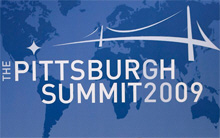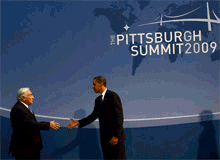
Typical street scene in Santa Ana, El Salvador. (Photo: iStock)
IMF Survey: G-20 Backs Sustained Crisis Response, Shift in IMF Representation
September 25, 2009
- G-20 says process of crisis recovery, repair is incomplete
- Backs a shift in IMF representation of at least 5 percent
- Agrees to launch framework for strong, sustainable, balanced growth
Leaders of the Group of Twenty (G-20) industrialized and emerging market economies at a summit in Pittsburgh pledged to sustain the strong policy response to counter the global economic crisis and provided political support for a shift in country representation at the IMF of at least 5 percent toward dynamic emerging market and developing countries.

Summit logo: Leaders said collective response to global crisis highlighted benefits of international cooperation (photo: Win McNamee/CNP)
PITTSBURGH G-20 SUMMIT
In a communiqué, the leaders said the forceful policy response to the crisis had helped stop a dangerous, sharp decline in global activity and stabilize financial markets. Industrial output is now rising in nearly all economies and international trade is starting to recover. The leaders quoted IMF analysis showing the global economy expected to grow at nearly 3 percent by the end of next year.
The leaders, meeting on September 25, said they decided to designate the G-20 as the “premier forum for our international economic cooperation.” The G-20 leaders also agreed to continue strengthening regulation of the international financial system; protect consumers, depositors, and investors from abusive market practices; and encourage the resumption of lending to households and businesses. They asked the IMF to help the G-20 with its analysis of how national or regional policy frameworks fit together.
At the same time, they stressed their commitment to the world’s poorest countries, saying “steps to reduce the development gap can be a potent driver of global growth.”
IMF Managing Director Dominique Strauss-Kahn welcomed the G-20’s continuing support of the IMF and noted the leaders’ reaffirmation of their London Summit initiative to reach agreement on IMF quotas by January 2011. “The April 2008 quota and voice reforms were a first step to enhance the voice and representation of the world’s emerging and developing countries. Today’s G-20’s commitment to a shift in quota share to dynamic emerging market and developing countries of at least five percent from over-represented to under-represented countries, and to protect the voting share of the poorest in the IMF, is a decisive move. This historic decision, and the emergence of the G-20 as a key forum for international economic cooperation, will lay the foundation for a deeper partnership in global economic policy between emerging and developing countries and the advanced economies,” Strauss-Kahn said.
Delivering on commitments
The G-20 leaders said they had delivered on their commitment to treble the resources available to the IMF to combat crises. “This commitment and the innovative steps the IMF has taken to create the facilities needed for its resources to be used efficiently and flexibly have reduced global risks. Capital again is flowing to emerging economies,” the communiqué said.

U.S. President Barack Obama (c) greets IMF Managing Director Dominique Strauss-Kahn at G-20 summit in Pittsburgh, United States (photo: Win McNamee/CNP)
The leaders said the collective response to the crisis has highlighted both the benefits of international cooperation and the need for a more legitimate and effective IMF. “The Fund must play a critical role in promoting global financial stability and rebalancing growth. We welcome the reform of IMF’s lending facilities, including the creation of the innovative Flexible Credit Line.”
The IMF should continue to strengthen its capacity to help its members cope with financial volatility, reducing the economic disruption from sudden swings in capital flows and the perceived need for excessive reserve accumulation. “As recovery takes hold, we will work together to strengthen the Fund’s ability to provide even-handed, candid and independent surveillance of the risks facing the global economy and the international financial system.”
They asked the IMF to support G-20 efforts under their new Framework for Strong, Sustainable and Balanced Growth through the Fund’s surveillance of countries’ policy frameworks and their collective implications for financial stability and the level and pattern of global growth. They welcomed moves to create a stronger resource base for the Fund, to improve global liquidity through allocations of Special Drawing Rights (SDRs), and the decision to boost assistance for low-income countries.
• Stronger resource base. G-20 members are committing over $500 billion to a renewed New Arrangements to Borrow to support IMF emergency lending.
• SDR allocations. The IMF has made SDR allocations of $283 billion in total, more than $100 billion of which will supplement emerging market and developing countries’ existing reserve assets.
• Support for low-income countries. Resources from the agreed sale of IMF gold, consistent with the IMF’s new income model, and funds from internal and other sources will more than double the Fund’s medium-term concessional lending capacity.
Landmark governance reform
The G-20 said that modernizing the IMF’s governance is a core element of efforts to improve the IMF’s credibility, legitimacy, and effectiveness. “We recognize that the IMF should remain a quota-based organization and that the distribution of quotas should reflect the relative weights of its members in the world economy, which have changed substantially in view of the strong growth in dynamic emerging market and developing countries.”
Who’s in the G-20?
The G-20 comprises Argentina, Australia, Brazil, Canada, China, France, Germany, India, Indonesia, Italy, Japan, Mexico, Russia, Saudi Arabia, South Africa, South Korea, Turkey, the United Kingdom, and the United States, plus the European Union. To ensure global economic fora and institutions work together, the Managing Director of the International Monetary Fund and the President of the World Bank, plus the chairs of the International Monetary and Financial Committee and Development Committee of the IMF and World Bank, also participate in G-20 meetings on an ex-officio basis.
Together, member countries represent around 90 percent of global gross national product as well as two-thirds of the world’s population.
They said G-20 leaders backed “a shift in quota share to dynamic emerging market and developing countries of at least five percent from over-represented to under-represented countries using the current quota formula as the basis to work from.” The leaders also stressed their commitment to protect the voting share of the poorest in the IMF.
Currently, there is roughly a 60/40 percent split in the shares at the IMF between advanced countries and emerging market and developing countries.
The G-20 leaders urged an acceleration of work toward bringing the IMF’s quota review to a successful conclusion. As part of that review, they agreed that a number of other critical issues will need to be addressed, including:
• the size of any increase in IMF quotas, which will have a bearing on the ability to facilitate change in quota shares;
• the size and composition of the Executive Board and ways of enhancing its effectiveness; and
• the Fund Governors’ involvement in the strategic oversight of the IMF.
• Staff diversity should also be enhanced.
As part of a comprehensive reform package, they agreed that the heads and senior leadership of all international institutions should be appointed through an open, transparent, and merit-based process.
Comments on this article should be sent to imfsurvey@imf.org


